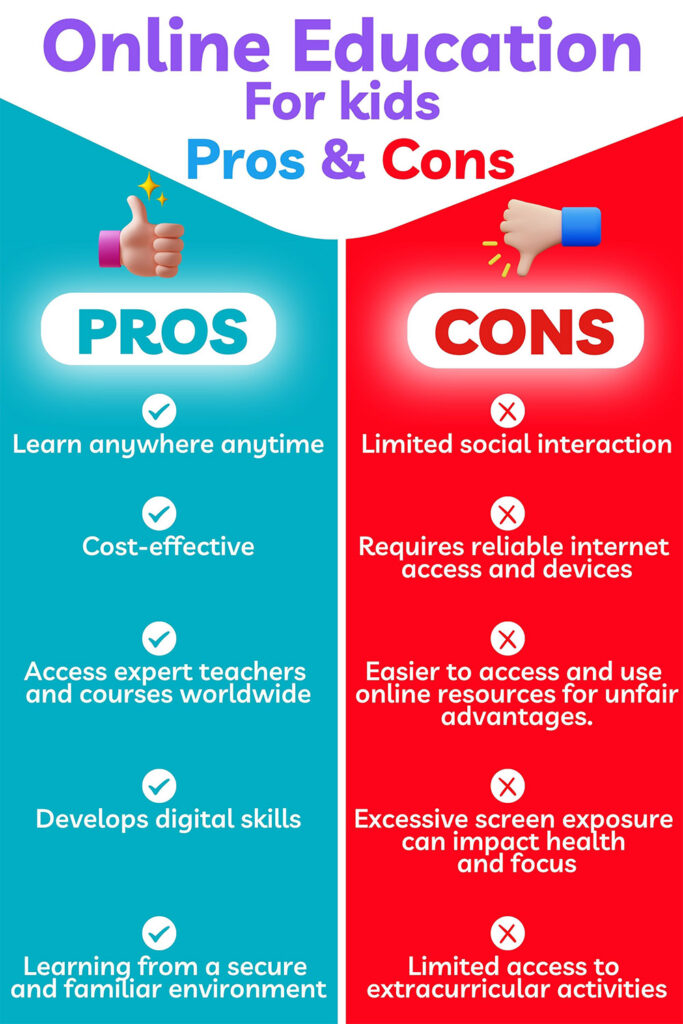After COVID-19 I think no one had imagined that online learning would stay with us in our daily life. We thought having online classes was only because it’s an emergency, life must go on, and this period is so extreme, that it requires extreme solutions. But as a home office is now a foundation in our household, education in the clouds is also a reality.
Even schools are adapting to modern times and are trying to incorporate technology into education. But of course, everything in life has positive and negative sides, even online education.
So, in today’s article, we will take a look at the pros and cons of online education for kids.
Advantages of Online Education for Kids

Learn Anywhere, Anytime
Geographical boundaries are gone; time zones don’t matter. The era of literal freedom is here and now. The time has finally come to truly adapt to our rhythms, schedules, and family dynamics. Of course, it is helpful if we, as parents, operate similarly in our work. There are no more tired teenagers on the bus at 7 in the morning. If they start their math lesson at 9 in the morning in the warmth of the home, so be it.
Cost-Effective Learning
When I was a kid, I walked to school; it was like five minutes. Today, if I want to bring my kids to school, I need to drive 15 minutes in the morning traffic jam while burning gasoline and my nerves. I carry the booklets and books that I bought entirely unnecessarily. Online learning solves this for me with a computer and, ideally, an ergonomic chair-desk combination (really worth it in the long run!)
Access to Expert Teachers and Courses Worldwide
When we think we want the best for our child, we can take that literally. Top-rated expert teachers and specialized courses are waiting to be found and used. According to our kid’s interests, we can find the best platforms and instructors who are happy to teach them and pass on extensive knowledge.
Development of Digital Skills
Digital literacy is a relatively new concept but is all the more critical. Our children grow into it from the moment they are born; digital skills grow with them.

They instinctively know how to use digital devices properly on the platforms, and they even teach us 😊 Of course, it is essential from what age we start allowing the use of these devices; WHO’s recommendation[1] is helpful to follow.
Learning in a Secure and Familiar Environment
The comfort of our homes becomes the backdrop for learning. A familiar environment can give our kids a sense of security, allowing them to pick up new knowledge without the distractions of a classroom. Is there any better than having history class in pajamas?
Disadvantages of Online Education for Kids
Limited Social Interaction:
We know there is a huge difference between face-to-face daily interaction and having mates on the other side of the screen. Learning is also about socialization, building friendships, and practicing understanding human situations, which can differ significantly from what happens online.
Reliable Internet Access and Devices Required

The joys of a stable internet connection—when it works. The system’s unexpected happenings can turn a smooth lesson into a digital rollercoaster. It’s all fun and games until the Wi-Fi decides to take a break. Also, having reliable hardware and software seems to be a dream sometimes. I wish I could reboot myself so many times, just like my Windows does!
Risk of Unfair Advantages
Some students may benefit from online learning – to the detriment of others. Involving external help and perhaps taking shortcuts are more accessible, which neither teachers nor parents are fans of. Preserving the integrity of learning is extra important in the online space.
Impact on Health and Focus
The media is full of the disadvantages of technology for children, and with online learning the most discussed issue, screen time is even more critical.
More screen time can lead to sleep problems, lower school grades, insufficient outdoor or physical activity, etc.[2] Watching a screen emitting blue light for hours, even at night, is not recommended even for adults.
Limited Access to Extracurricular Activities
Traditional schooling also offers tons of possibilities to try. Sports, crafts, choir, and theatre, all add to the child’s learning as a whole. The lexical knowledge and knowledge acquired through experience would be just as crucial since the kid learns even when he is not hunched over the book.

Final Words
Thinking about all this, we have to balance very skillfully as parents, taking the child by the hand and accompanying them more closely than if we take them to school. The fact that our kids learn using methods utterly unknown to us is also learning for us; for them, it is “school”.
We can find incredible opportunities for our children and new ways to learn, which would have been inaccessible “offline” or perhaps did not even exist.
However, we also have to stand there and actively observe what is happening, where the world is going, and what the current expectations are, and translate all this for our child; why exactly is it worth studying? Parents must take on a teaching and accompanying role, even if we are not the official teachers.
ALSO READ: How Much Weight Gain is Optimal During Pregnancy Per Week?
[1] https://www.who.int/news/item/24-04-2019-to-grow-up-healthy-children-need-to-sit-less-and-play-more
[2] https://www.aacap.org/AACAP/Families_and_Youth/Facts_for_Families/FFF-Guide/Children-And-Watching-TV-054.aspx







